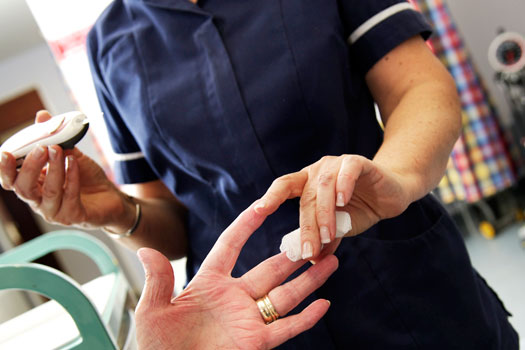How our practices are collaborating to improve diabetes care

The problem
Southwark GP practices show a wide variation in the control of diabetes, as indicated by patients’ HbA1c levels and completion of the eight NICE-recommended annual care processes. Our GP federation explored ideas for collaborative work with the aim of reducing this variation in care.
What we did
With the help of our GP federation, Improving Health Ltd, we approached other practices with similar difficulties with diabetes control measures in late 2017 to work together to address this problem. Our three practices agreed to work together in a pilot. We had several meetings and realised the common pitfalls leading to our variable control of diabetes were:
- Inefficient and outdated practice call/recall systems for inviting in patients
- A lack of specialist nurses
- Lack of patient-centred care.
We decided to follow a quality improvement cycle as follows:
- Set up a revised call/recall system to invite selected patients with raised HbA1c over 7.5% who are likely to engage with the service (excluding patients who are housebound, those with severe mental health problems, repeat non-attenders and those with multiple morbidity who were followed up according to their needs);
- Employ two diabetes specialist nurses (DSNs) across the three practices, for once-weekly diabetes clinics over a 10-week period. Nurses were recruited through a nursing agency (Diabetes Training and Management Services);
- Measure HbA1c before and after the study.
The federation readily agreed to support us with our plan with facilitation and funding.
Initial results
Between three and six months after the start of the intervention, two practices saw a reduction in HbA1c levels in the majority of targeted patients who attended the service. At the best performing practice, among the 26 patients who attended, HbA1c levels fell by 1.6% on average – a marked reduction. At another practice the average reduction in HbA1c was 0.4% among the 32 patients included. The third practice saw no significant change in HbA1c overall.
Exploring the variation across practices, we found better performance was dependent on:
- Adherence to the targeted selection of patients in the call and recall;
- Support to the call and recall system from a dedicated, named administrator;
- A dedicated clinician to support the DSN;
- Strong focus on the quality of the DSN consultation itself (see ‘principles of diabetes collaborative care’ below).
In addition we were aware the third practice that did not see improved diabetes control had problems with continuity of staff, including illness of their DSN.
Principles of diabetes collaborative care
- Recall letter to the patient forms the basis of the consultation;
- Exploration of the patient’s understanding of the targets;
- Discussion of the value of diet;
- Discussion of concordance and how drugs work;
- Attention to the eight care processes of diabetes care;
- The recording of a short-term (3-12 months) Personal Care Plan.
Future
We have since agreed with the Federation that we should run a second quality improvement exercise. We are now extending the cycle to six practices that were keen to take part in the project after seeing our initial results.
Our new project is already underway with a revised intervention as follows:
- One DSN working across the six practices on a monthly basis – for the sake of continuity and to aid evaluation we decided to employ one individual;
- GPs and other clinicians to run appointments using principles of collaborative care (see above);
- Clinicians supply patients with diet books and simple literature on how drugs work;
- A revised focused recall system to support the DSN clinics (SMART recall*) which supports personalised care planning;
- A questionnaire and a telephone focused interview of patients taking part in the study;
- Data analysis extraction and statistical support from the Federation.
*The SMART recall system is operated by a ‘diabetes champion’ who selects patients most likely to engage with the help of clinicians familiar with the patient’s history and background. Importantly, the letter (see example below) includes the last HbA1c, cholesterol and blood pressure reading to facilitate a patient-focused discussion on their target readings to avoid diabetes complications.
Our approach is proving successful so far. We feel this scaled up working has not only benefited the patients but also the practices, which are now working in collaboration on other clinical and management activities and providing peer review of one another too. We recommend other practices should try this out to improve patient care and help build practice staff morale.
Dr Kishor Vasant, Dr Ademola Salau and Dr P Arumugaraasah are GP partners in south London
Example of recall letter facilitating patient-centred care
Visit Pulse Reference for details on 140 symptoms, including easily searchable symptoms and categories, offering you a free platform to check symptoms and receive potential diagnoses during consultations.









